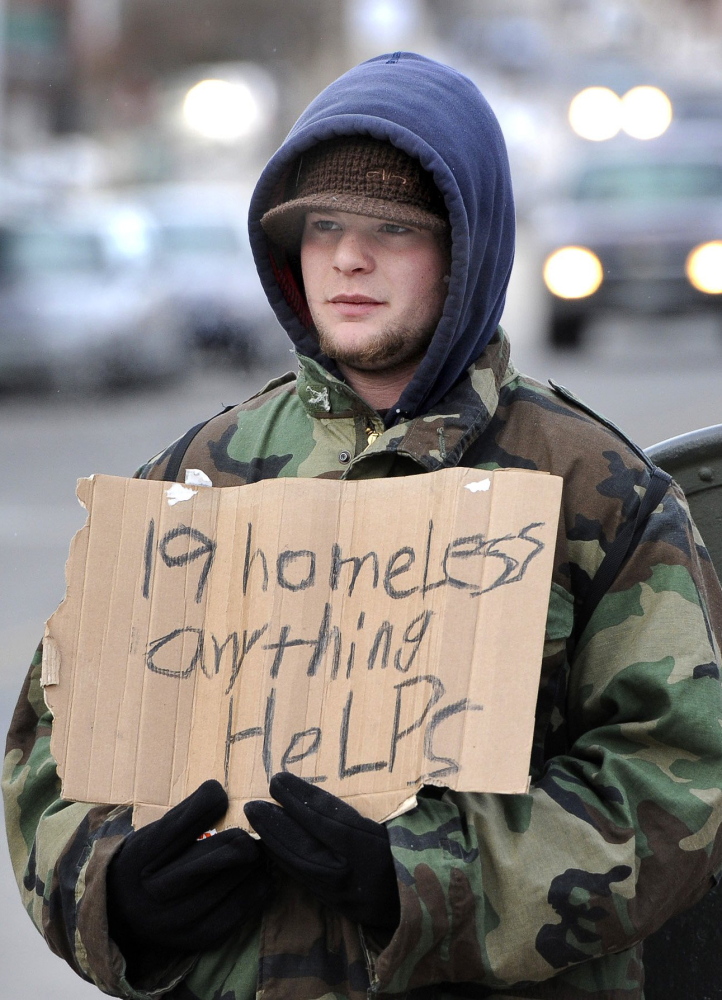ORONO — Recently, the Portland Press Herald supported the U.S. District Court’s ruling defending panhandling as “free speech,” in opposition to the city of Portland’s efforts to restrain such activity on the grounds of public safety (“Our View: Rejection of median-strip panhandling ban right call for Portland,” Feb. 13).
The paper called for searching for the “root causes” of poverty rather than fighting over the “symptoms of poverty,” and hence posed the larger question of linking the behavior of individuals to systemic problems.
News flashes from history: The economic depression that began in 1873, the most serious the nation had then ever witnessed, spawned legions of jobless workers who crisscrossed the land in search of employment and gave rise to the nation’s first “Tramp Problem.” The newly uprooted were quickly dubbed communists and enemies of religion, property and society.
LITTLE PUBLIC SYMPATHY
Maine could escape neither the economic dislocations of the period nor its “tramp” byproduct. With alarming regularity, newspapers carried columns about the tramp menace and monitored their movements and activities. The Lewiston Evening Journal, for example, reported that “tramps, as a rule are lazy thieving vagabonds, and undeserving of sympathy or tenderness.”
While recognizing the obligations of humanity to those who suffer, it was trying for those who sought to juggle humanitarian considerations with the “dangerous and pestilent class” of tramps.
Insisting that they be put to work was a favorite solution, grounded in the conviction that “if they must be fed, then let them be made to yield some return for their living by labor for the public who feeds them.” If they refuse to work, they simply should face the consequences – “they need not be fed.”
The Kennebec Weekly Journal reported that “Our people (in Farmingdale) are pretty evenly divided on the subject of disposing of them (tramps). One half being for shooting them at once, and the other half for forming a vigilance committee . . . .”
The tramp question was discussed at a convention of jailers, sheriffs and county commissioners held in Augusta in January 1878. The sheriff of Kennebec County was reported to have remarked that he had not known “a great many honest or industrious men to become tramps.” Rather, “the disease” was caused “generally by chronic laziness with no disposition to work.”
Other spokespersons at the meeting endorsed longer prison sentences. Some advocated putting them to work by sending the tramps on “sea and fishing voyages,” or putting them to work on the land; if they refused, they would get “the lash.” Others, upon hearing of the idea that if some of them were to be used in the fishing business, commented that some to the tramps “must” be used for bait.
Still others sought to draw a distinction between the pauper and the “professional tramp,” the “deserving” poor and others in need. For some, the criminal remedy for the “tramp problem” was not to be found in the harsh remedies often proposed, but rather “in the application of Paul’s principle, which says to the lazy man, work or starve, and deals out kindness and charity to the man who is ready to work when work is supplied.”
EASY TO BLAME THE INDIVIDUAL
In 1878, the Legislature responded to the anxiety caused by the new jobless nomads with legislation that provided that “No person not a resident of this State shall travel from town to town, or from place to place in any town, begging for food or shelter, nor shall such person sleep or lodge in any barn or other building without the consent of the owner thereof.”
Punishment took the form of a fine of $20; in the case of failure to pay, the tramp was committed to the nearest county jail that had a workshop attached, to be “confined to hard labor,” etc.
It was clearly easier to explain away joblessness and “the tramp problem” by pointing to individuals with character defects than it was to trace the problem to systemic factors linked to the gyrations of the economic system.
But it is an exaggerated view of personal responsibility to suggest that success and failure, and one’s place on the economic pyramid, are always individual in origin and disconnected from larger social, ideological or historical contexts, or that links between wealth and virtue and poverty and vice are immutable laws of the universe.
Witness the countless unemployed Americans with a history of struggle and work in their portfolios who are ensnared in today’s world of advancing technology, global markets and hiring halls. Shall we assume that they willed their current economic plight into existence?
— Special to the Telegram
Send questions/comments to the editors.



Comments are no longer available on this story